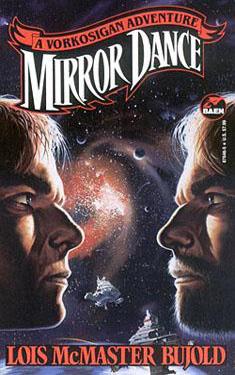Lois McMaster Bujold
Completed 10/21/2013, Reviewed 10/23/2013
3 stars
After loving Barrayar and not really liking The VorGame, I wasn’t sure what to expect from the eighth book in the Vorkosigan
Saga, and the third of Bujold’s three Hugo winners from the series. Being on this Hugo quest, I had not read the
novel where Mark Vorkosigan, Miles’ clone/brother, is introduced, and I was
concerned that there would be little or no character development. I was pleasantly surprised to find that this
was not JASO…just another space
opera.
 Be aware that the synopses of “Mirror Dance” around the
internet are not entirely accurate. I
regularly saw things like “…Miles faces off with his clone…” or “…Miles
confronts his clone…” while prepping for this book. Instead, this book is really about Mark
finding his place in the world.
Be aware that the synopses of “Mirror Dance” around the
internet are not entirely accurate. I
regularly saw things like “…Miles faces off with his clone…” or “…Miles
confronts his clone…” while prepping for this book. Instead, this book is really about Mark
finding his place in the world.
Mark has some serious existential issues. He wants to understand who he is separate
from Miles. And very specifically, in an
effort to reconcile his past, he wants to rescue fifty clones being developed
for the life-extending whims of their evil, rich progenitors. He shanghais a ship from Miles’ fleet by
impersonating him and launches his attack.
Miles discovers the plan and attempts to help Mark. What ensues is entertaining and thought-provoking.
I love a good existential crisis and I was drawn into
Mark’s. Throughout the book, he
primarily struggles with the thought he is just an insignificant copy of his
smarter, successful, swashbuckling brother.
He must also confront the fact that he is no longer a slave to his
original purpose for being, to kill and replace Miles and undermine the
Barrayaran empire.
I was reminded of Frankenstein, which I had just read about
a month earlier, both in its similarities and contrasts. There are times when Mark even refers to
himself as a monster. Like Mark, the
Frankenstein creature didn’t ask to be created, but now that he is, he has to
make sense of the world. In contrast to
the monster’s response to creation, Mark takes a higher road, but is still
plagued by inner demons.
My favorite chapters were the ones where he meets Miles’,
and thus his, parents. This is probably
because I was introduced to and loved Cordelia Vorkosigan, their mother, in
“Barrayar.” Her smart, sardonic, off-worldly
perspective on society adds some welcome relief for Mark and the reader.
Bujold enters some dark territory with this novel. She explores the results of torture and
victim reprogramming. There’s a very
uncomfortable scene where Mark has his first, though inappropriate, attempt at
sexual expression. Later in the novel,
Mark experiences dramatic disassociation due to repeated torture. I was impressed that the author took on such
serious topics.
Despite my excitement with the ground Bujold covers, I have
to admit that I don’t care for her writing style. The characters are still two-dimensional and
the prose is, well, not prose. The
dialogue is mechanical and the constant exposition becomes tedious. It feels like at least once per chapter, you
get a monologue that begins with, “The true story is…”, “Our real mission is…”
or “My evil plan is…” It’s the literary
equivalent to musical opera’s “park and bark.”
I give this book three stars. It’s good space opera with some strong
attempts at depth, but still doesn’t reach the bar set by “Barrayar.”
No comments:
Post a Comment